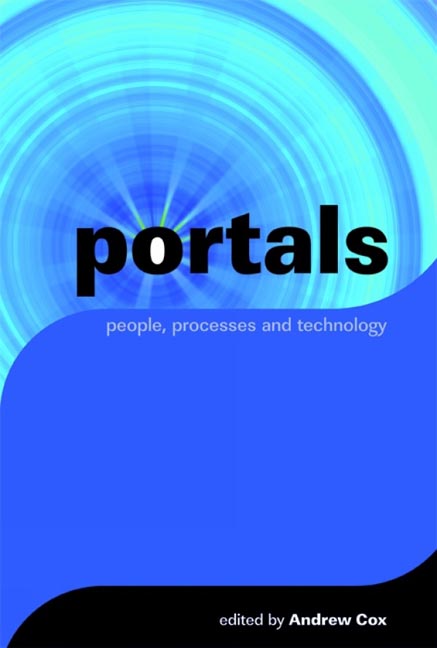Section 1 - Core themes
Published online by Cambridge University Press: 09 June 2018
Summary
The first section of this volume addresses two fundamental clusters of questions about portals. First, what is a portal? What distinguishes one from any other service? What functions, features or affordances can or should we expect to find in a portal? What types of portal is it useful to identify? A second set of questions revolve more around how a portal is designed, especially how to incorporate users in the design process – and how to manage the portal on an ongoing basis. These will be questions that all the chapters of the volume address, but in this section authors tackle them at a more general level.
My own chapter encourages the reader to re-examine their own experience of different services that call themselves, or are called by others, portals, and to ask: what is the common ground? What common themes emerge? The discussion suggests that it may be possible only to identify themes – not a hard and fast definition – but this helps us understand the emergent character of the concept and to identify the existence of less recognized counter-trends. The chapter also begins to ask what forces operate to control the development of the portal as a project; what organizational influences are likely to govern the shape of its evolution? Andrew Madden's chapter reflects further on the evolution of the web portal concept, in the context of internet searching behaviour.
Franklin and Hepworth, Probets, Qutaishat and Walton address the first cluster of questions. Franklin reviews underlying technologies, again trying to explore the need organizations have for a portal and what is achievable. The examples are from the university sector, but the principles are probably generic. There is recognition again that the portal is an evolving concept. The stress on middleware and on access management is notable. Simplifying sign-on is a key objective (as Schelleman demonstrates in Chapter 14) and it is the bedrock on which things like personalization will be achieved. Hepworth et al. concentrate precisely on personalization, drawing on a very wide range of models to consider what could be useful to users, what is realistic. Looking at most existing portals what has actually been done in the way of personalization is quite limited, so this chapter is inevitably relatively conceptual. Yet there seems little doubt that personalization/customization/ adaptivity will be a continuing major theme in portal development.
- Type
- Chapter
- Information
- Portalspeople, processes and technology, pp. 1 - 2Publisher: FacetPrint publication year: 2006



